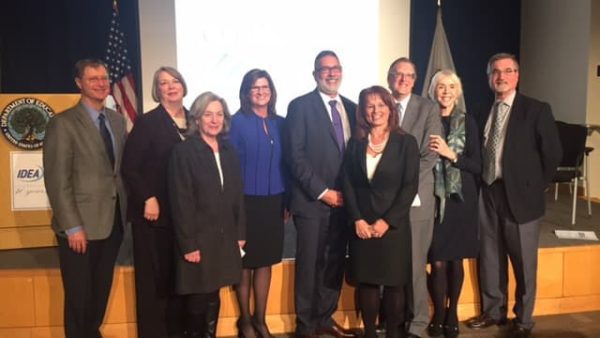Education professor participates in White House symposium

Special education and child development professor David Test was one of six leading scholars invited to speak at a recent White House symposium celebrating the 40th anniversary of the Individuals with Disabilities Education Act (IDEA).
The event, headlined by U.S. Secretary of Education Arne Duncan, was part of a national simulcast that explored the current state and progress made as a result of IDEA. The 1975 Congressional act guaranteed a free appropriate public education for children with disabilities, and one that meets their unique needs and prepares them for further education, employment and independent living
In 1975, IDEA literally opened the schoolhouse doors for students with disabilities, “who just weren’t welcome prior,” Test said. Forty years later, its impact has spread well beyond providing access to schools.
“Over time, it’s improved pre-school services for early intervention; it’s changed the way we provide transition services; it’s improved academics; and it’s increased inclusion for kids with disabilities in regular education classes.”
Test said though progress has been gradual, the integration of people with disabilities into standard education classrooms has started to translate into a shift in society at large.
“I think as you see more and more kids with disabilities in general education classrooms, it has become an expectation over time. So their peers expect and feel that people with disabilities should be part of everything,” said Test who has spent his career trying to make that expectation a reality.
His research focuses on self-determination, transition, community-based training and supported employment for students with disabilities. He also co-wrote the first transition methods textbook and is co-director of the National Secondary Transition Technical Assistance Center.
“There’s so much involved for kids with disabilities. There’s teaching them the academic skills, but there is also teaching them social skills, leisure/recreation skills and independent living skills,” Test said. “That means getting families involved, so that they understand the rights that they have while there in school aren’t there when they graduate. The families need to know that it’s a whole different ball game.”
The transition following graduation has become easier for students with disabilities during the years thanks to the Individual Education Plan (IEP), a tool connected to IDEA that helps educators tailor support to each student’s goals and needs. Test’s vision for the evolution of the IEP has been increased student involvement.
“The more they can lead their meetings, the more we can be sure the kids are getting the most out of the program. The IEP is also an excellent tool for teaching these students self-advocacy.”
Aside from the telltale funding issues of a large federal initiative, a central concern for IDEA’s leaders is properly training teachers to administer the program. Test said changes in pay structures for master’s degrees and dwindling grant funding have made that task more difficult. It’s now up to individual college programs to integrate the material into their instruction, he said.
“We’re lucky here because we value it, so our students get quality preparation on that information, but that isn’t the case at every institution.”
For a program that was been deeply impactful, Test added that IDEA is long overdue for reauthorization, and the hope is there will be a vote in Congress next year.